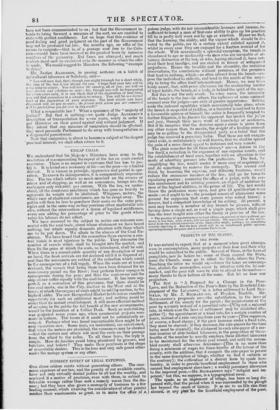INDIRECT EFFECT OF LEGAL EXPENSES.
ONE abuse seldom exists without generating others. The enor- mous expenses of our law, and the paucity of our available courts, have not only virtually denied justice to all but the wealthy, and rendered it a matter of prudence, even with them, to submit to tolerable wrongs rather than seek a remedy worse than the:dis- ease • but they have also given a monopoly of business to a feW leading counsel, which (waiving the consideration of other points) renders their emoluments so great, as to make the, puisne judge; with-its not inconsiderable honours and iideome,An- sufficient to tempt a man of first-rate -ability to give up his practice till he is pretty well worn out by age or exertion. Hence we find, that the learning, the ability, and the vigour which should be de- voted to the public, are to a certain extent enlisted against it, whilst in every case they are engaged for a fraction instead of for the whole. With occasionally a- splendid exception, the bench is abandoned to age or mediocrity—to men who are incapable of at- taining distinction at the bar, or who, having attained it, have out- lived their best faculties, and are steeled in favour of antiquated prejudices. Hence the twaddle and the absurdity, the irrelative observations, the conclusions without premises, or the premises that lead to nothing, which—so often uttered from the bench—ex- pose the individual to ridicule, and tend in the minds of the majo- rity to bring the office itself into contempt. Hence, we may fear- lessly assert, that, with every allowance for the contracting natitre of legal habits, the bench, as a body, is behind the spirit of the age, But this is not the only result. In some cases, the inferiority of the bench to the bar—in others, the influence of some eminent counsel over the judges—are evils of greater importance. Setting aside the indecent squabbles which occasionally take place, when the bench is suspected of yielding, or a barrister is inclined to form a favourable opinion of himself, the suitor is frequently tempted to further litigation, if he fancies his opponent has misled the judge and jury, through their mere want of knowledge or acuteness. But if he imagines that the decision upon a cause is given from any other reason than its merits, the weight of a leading counsel may be as galling to the disappointed party as a belief that the judge has received a pecuniary bribe. That these are not exagge- rated evils, is unfortunately so well known, that we shall be spared the pain of a more direct appeal to instances not very remote. The plain remedies for all these abuses,* are—a reform in the law itself, a reduction in the expenses of our superior courts, and the establishment of local ones, together with an alteration in the mode of admitting persons into the profession. The first, by simplifying the law, would render it more easy of acquirement, and do something to remove the monopoly. The second and third, by lessening the expehse, and diffusing business, would reduce the enormous incomes of the few, and go far towards equalizing practice ; rendering the office of a judge, with its cere tain emolument and its retiring pension, an object of ambition to men of the highest abilities, in the prime of life. The last would throw the profession more open, and give (if qualification were made—as it ought to be—the principal reason of admission) some ground for supposing that every person who called himself a lawyer, had a competent knowledge of his calling. At present, a man may become a member of any branch he pleases, without having done a single act, or read a single page, which shall give
him the least insight into either the theory or practice of the law.
• The practice of appointing men to legal offices, cn account of their political opi- nions, is one that, more or less, will always obtain. The separation of the mints- teriai from the judicial functions of the Chancellor might, perhaps, do something towards checking it. But the best check will be an enlightened public opinion, operatingthrough the press and a reformed Parliament.


























 Previous page
Previous page